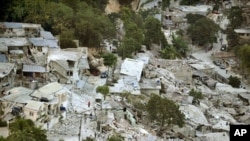Donors have pledged hundreds of millions of dollars in aid to Haiti since the January 12th earthquake. Reporting for VOA from Paris, Lisa Bryant takes a look at the chances the international community will make good on its promises.
In 2004 a series of deadly tsunamis hit Indonesia and several Asian countries. Donors pledged massive amounts of money for emergency relief and reconstruction.
Now, as the international community pulls out its checkbook for this month's earthquake in Haiti, it is worth looking at whether those old tsunami pledges ever materialized.
The Paris-based Organization for International Cooperation and Development did just that, and the results are generally positive says Yasmin Ahmad, who manages the aid statistics unit for the OECD.
"Looking at the final figures, although we cannot distinguish what is specifically for tsunami in the aid program, but most of the pledges that were made for humanitarian assistance so fast, quick aid, was dispersed," said Ahmad. "So the track record, I would say for the tsunami and for humanitarian disasters is probably good in the sense that members are living up to the commitments they made."
Analyst Abby Stoddard of Humanitarian Outcomes, a research group looking at the impact of aid, says initial disaster relief pledges are also coming through for Haiti.
"The volume of money coming in now for the acute crisis is actually no problem," said Stoddard. "It is actually coming in faster than the aid agencies can program it. The problem will come for the longer-term recovery and reconstruction days when the news crews have gone home and there is less attention.
Analysts say past history is more checkered when it comes to longer-term assistance. Stoddard says a 2004 pledging conference for Afghanistan is a case in point. Not all of the billions of dollars of promised assistance was delivered.
"In the past, we have seen pledges have been very slow to materialize and that sometimes there is double counting so governments will count what it has already given for the emergency toward the pledge for the longer-term reconstruction phase," said Stoddard.
Ahmad of the OECD also notes that vows to boost overall development aid by a number of industrialized nations, including Italy, Japan and France, are unlikely to be met by this year's deadline.
But aid tracking mechanisms are becoming more sophisticated and Stoddard predicts they will push governments into honoring their pledges, with Haiti being a test to hold them accountable.
Donors Expected to Make Good on Haiti Relief Pledges










